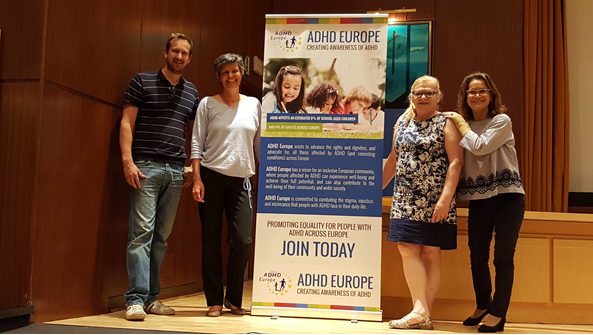On Friday 1st June the MiND EU project hosted a successful patient information evening in collaboration with ADHD-Europe, the ADANA Foundation and Dr Toni Ramos-Quiroga at Vall d’Hebron Hospital in Barcelona. Anyone with an interest in research into Autism and ADHD were warmly invited to view posters and presentations on the latest developments from the MiND project and our collaborators.

The world of science is often seen as having a mind of its own, which does not often engage with the community. However, the MiND project would like to change this perception! We hosted a patient information evening to discuss our work on ASD and ADHD with the public, with the aim to share our knowledge of these disorders and to promote inquisitive minds.
The presentations were opened by Dr. Toni Ramos-Quiroga and Andrea Bilbow OBE, President of ADHD Europe. Although our speakers varied in their backgrounds, they are all active in genetics and psychiatric research, with a passion to improve our understanding of ADHD and ASD.
Professor Bru Cormand, who leads a Neurogenetics Research Group at the University of Barcelona, talked about the genetics of Autism and ADHD and the role of the environment in the development of these disorders. Professor Cormand explained that we share more than 99% of our genome with any other human being, so it is the remaining 1% which makes the differences among individuals, both in health and disease. Biomedical researchers look into this fraction of the genome to find the causes of many diseases. These genes are instructions for producing proteins, some of which are involved in the communication process between neurons in our brain. It is important that we study these genes because the connectivity between neurons is crucial. When this mechanism is impaired, due to alterations in certain genes, the result is often a psychiatric condition like ADHD or ASD.
Professor Cormand also explained how we can use family studies to understand ASD and ADHD. From this type of research we now know that genetic factors play a very important role both in ADHD and in ASD, with a share of more than 70%. The rest possibly corresponds to environmental risk factors, such as prenatal or birth complications. Other external factors, like vaccines, do not contribute to these disorders. To date, we have been able to identify several contributor genes for both ASD and ADHD. Professor Cormand eloquently described our genome as a ‘crystal ball’ “if correctly asked, it can provide information about things that will take place in the future. Our health and our disease is, to a great extent, written in the genes… but they can also help us to find ways for improvement”.
Further research in this area will be highly beneficial for patients in the future for several reasons:
- They provide basic knowledge on the causes of the disorders, which can be useful in diagnosis or even for prognosis (anticipation of future complications).
- It points at potential therapeutic targets, i.e. proteins that can be targeted with drugs.
- The genetic profile of an individual can predict response to a treatment or side effects, if any.
However, we still need some time to complete the full genetic landscape before we fully understand these disorders!
Dr Alejandro Arias-Vasquez, an associate professor in genetic epidemiology informed attendees of an exciting, up and coming area of research: the microbiome and its role in ADHD. Through research we have learned which are “good” and “bad” foods that influence the risk of being obese, having diabetes, or suffering from cardiovascular disease. However, we are also beginning to learn that what people eat can also affect the way the brain works, although these mechanisms are currently unclear.
So far research has shown that there is convincing evidence of a sizeable impact – both harmful and protective – of nutrition components on behaviors such as impulsivity and compulsivity. Currently, the experts do not know how big the impact (effect size) of these non-pharmacological interventions is, which raises questions such as:
- Can people improve our overall brain functioning by improving diet and lifestyle?
- Can we replace medication used for treating psychiatric disease with specific diets?
- Shall we complement pharmacological treatment with specific diets to improve behavior?
Dr Arias-Vasquez hopes to answer these questions by leading a new research consortium called Eat2beNICE. This project will study different diets and nutritional supplements in children and adults. It is anticipated that this research will create new evidence-based approaches for making recommendations about nutrition and its links to changing behavior. This could mean that specific dietary changes could be one or part of the treatment options for ASD and ADHD in the future.

Dr Laura Gisbert explained her research as a psychiatrist at Vall d’Hebron. Currently, Dr Gisbert is involved with many research projects (that take place in her clinic). In particular, there are two clinical trials testing out medications for ASD and ADHD: Vasopressin for adults with ASD and Guanfacine for children with ADHD. Dr Gisbert explained that two main approaches are used to develop pharmacological agents for ASD. One is re-purposing treatments from other psychiatric disorders that have symptoms in common with ASD. The second approach is to target the neurobiological processes underlying ASD. Although there have been studies of medications that reduce ASD symptoms, by targeting specific circuits in the brain, there is still a lack of clear evidence to recommend the routine use of any of these medications for the moment. Similarly in ADHD, more research is needed to find effective medications with fewer side effects. Not all patients can tolerate stimulant medications that are often prescribed for ADHD, and therefore alternatives need to be found. Furthermore, this medications that can simultaneously improve symptoms of frequently co-occuring disorders such as ASD, would also be advantageous to patients. It is hoped that the clinical trials taking place at Val d’Hebron will contribute to this work, in order to improve treatment strategies for patients with ASD and/or ADHD.
These presentations were highly engaging as demonstrated by our audiences need for a long Q&A session with our speakers on various topics from treatment strategies to genetics.

Attendees were also highly interested in the poster presentations given by the MiND early stage researchers (Viola Palladino, Niall Mortimer, Anu Shivalikanjli, Joanna Szopinska-Tokov, Sara Boxhoorn and Francesca Waddington). These posters represented the diverse range of topics studied within the MiND project, which include the gut microbiome in ADHD, the genetics of ADHD, stem cell research, how we measure attention in ASD and ADHD and the relationship between these two disorders. These also proved to be very thought-provoking with many discussions between members of the public and our researchers.
The MiND project is proud that our event was so insightful and to have elicited such a great response!
If you would like to find out more about our research see
mind-project.eu
Eat2beNice

